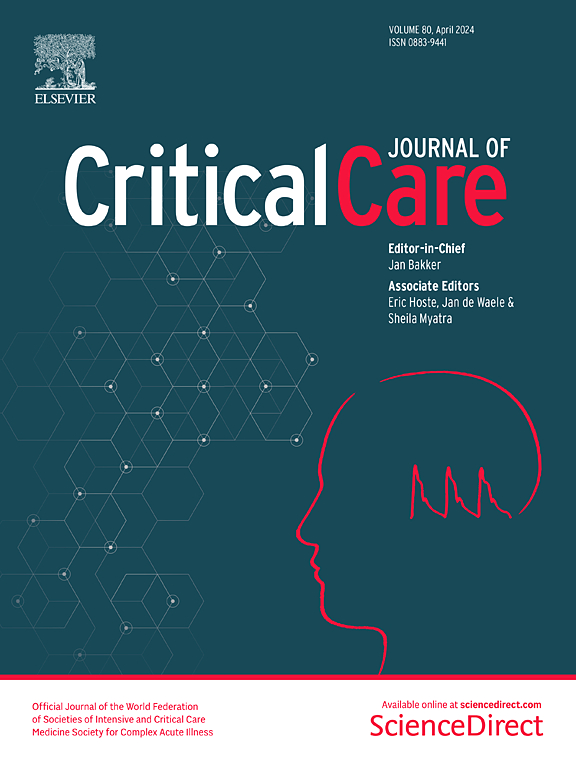研究无事先同意程序和干预对重症监护死亡率的影响:随机对照试验的荟萃流行病学研究
IF 9.3
1区 医学
Q1 CRITICAL CARE MEDICINE
引用次数: 0
摘要
在重症监护随机对照试验(RCTs)中,获得患者或代理人的知情同意可能具有挑战性,并可能延迟随机化,从而潜在地影响干预效果。无事先同意研究(RWPC)程序越来越多地用于促进及时纳入,但其对试验结果的影响仍不确定。我们的目的是评估RWPC程序是否与危重病随机对照试验中干预对死亡率的影响差异有关。我们检索了PubMed和Cochrane系统评论数据库,检索时间从成立到2024年8月1日。我们纳入了评估危重成人治疗干预措施的随机对照试验的荟萃分析,将死亡率报告为主要或次要结局。我们采用两步法进行了一项元流行病学研究。首先,我们计算了每个荟萃分析中的优势比(ROR),以比较使用RWPC和使用标准同意的rct之间干预措施对死亡率的影响。其次,我们使用随机效应模型在meta分析中汇总了这些误差。次要结局包括从入组到随机化的延迟和招募率。我们纳入了42项荟萃分析,包括323项随机对照试验和103,011例患者,其中59项随机对照试验(18%)采用RWPC程序。使用RWPC的试验是最近的(中位数年份:2015年[2008-2019年]与2012年[2007-2017年];P < 0.01),较大(样本量:203[101-605]对72 [40-162];P < 0.01),多中心更为常见(80% vs. 43%;P < 0.01),总体偏倚风险较低。在有RWPC和没有RWPC的试验中,干预对死亡率的影响没有显著差异(合并ROR, 1.05 [95% CI 0.83-1.34];²= 71.7%)。RWPC与较短的随机化时间相关(3[1−9]vs. 11[4−23]小时;P < 0.01)和更高的招募率(9.6 [4.7-18.7]vs. 4.5[1.9-8.6]例/月;p = 0.01)。在危重症随机对照试验中,RWPC程序与干预对死亡率的影响差异无关,但与较短的随机化时间和较高的招募率有关。本文章由计算机程序翻译,如有差异,请以英文原文为准。
Research without prior consent procedure and intervention effect on mortality in critical care: a meta-epidemiological study of randomized controlled trials
In critical care randomized controlled trials (RCTs), obtaining informed consent from patients or proxies can be challenging and may delay randomization, potentially affecting intervention efficacy. Research without prior consent (RWPC) procedures are increasingly used to facilitate timely inclusion but their impact on trial outcomes remains uncertain. We aimed to assess whether RWPC procedures are associated with differences in intervention effects on mortality in critical care RCTs. We searched PubMed and the Cochrane Database of Systematic Reviews from inception to August 1, 2024. We included meta-analyses of RCTs evaluating therapeutic interventions in critically ill adults, reporting mortality as a primary or secondary outcome. We conducted a meta-epidemiological study using a two-step approach. First, we calculated the ratio of odds ratios (ROR) within each meta-analysis to compare the effect of interventions on mortality between RCTs using RWPC and those using standard consent. Second, we pooled these RORs across meta-analyses using a random-effects model. Secondary outcomes included the delay from eligibility to randomization and the recruitment rate. We included 42 meta-analyses comprising 323 RCTs and 103,011 patients, of which 59 RCTs (18%) used a RWPC procedure. Trials using RWPC were more recent (median year: 2015 [2008–2019] vs. 2012 [2007–2017]; p < 0.01), larger (sample size: 203 [101–605] vs. 72 [40–162]; p < 0.01), more frequently multicenter (80% vs. 43%; p < 0.01), and had lower overall risk of bias. There was no significant difference in intervention effect on mortality between trials with and without RWPC (pooled ROR, 1.05 [95% CI 0.83–1.34]; I²=71.7%). RWPC was associated with shorter time to randomization (3 [1−9] vs. 11 [4−23] hours; p < 0.01) and higher recruitment rates (9.6 [4.7–18.7] vs. 4.5 [1.9–8.6] patients/month; p = 0.01). In critical care RCTs, RWPC procedures were not associated with differences in intervention effect on mortality but were linked to shorter time to randomization and higher recruitment rates.
求助全文
通过发布文献求助,成功后即可免费获取论文全文。
去求助
来源期刊

Critical Care
医学-危重病医学
CiteScore
20.60
自引率
3.30%
发文量
348
审稿时长
1.5 months
期刊介绍:
Critical Care is an esteemed international medical journal that undergoes a rigorous peer-review process to maintain its high quality standards. Its primary objective is to enhance the healthcare services offered to critically ill patients. To achieve this, the journal focuses on gathering, exchanging, disseminating, and endorsing evidence-based information that is highly relevant to intensivists. By doing so, Critical Care seeks to provide a thorough and inclusive examination of the intensive care field.
 求助内容:
求助内容: 应助结果提醒方式:
应助结果提醒方式:


